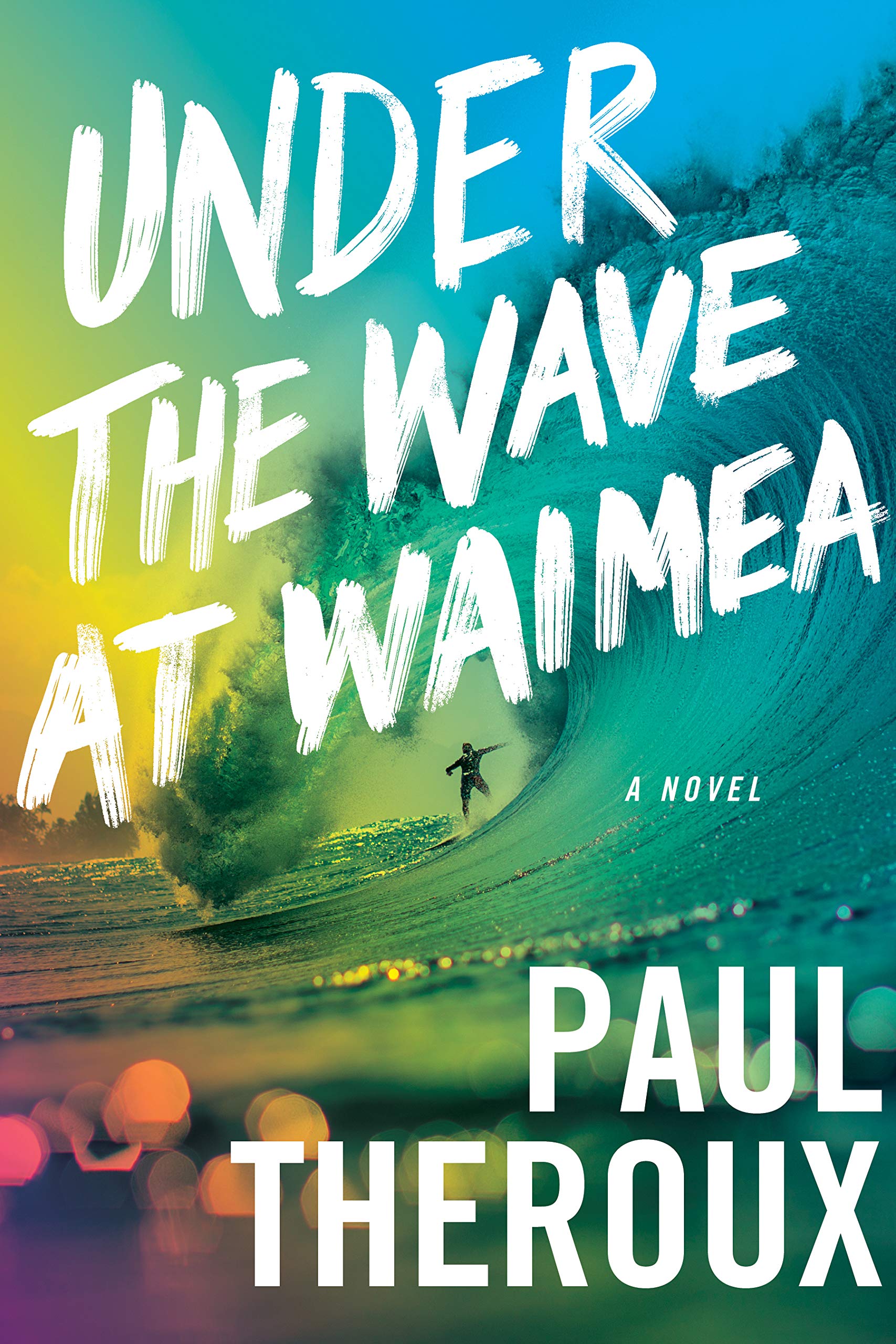
[Mariner Books; 2021]
Recently minted octogenarian Paul Theroux (born in April of ’41) would have us know that his life, a writer’s life, has been well-spent. Yes, the costs to decency and civilized familial connection have been high. But, hey, all’s good. There was no plausible otherwise.
Such is the most obvious takeaway from his latest offering, Under the Wave at Waimea. He has other thoughts to urge too in this novel about a once-champion surfer now gone to seed (pau, as the Hawaiians in their pidgin say): thoughts about ageing, about narcissism’s opposites (caring and connection), about karma, about Hawaii’s subaltern classes, and, too, about writing’s and surfing’s comparable features. However, his principal message is the one I first identify, namely, that he, Paul Theroux, has lived his life, a writer’s life, well.
And who’s to argue with that?
He is, after all, the most achieved travel writer that America has ever produced. Yes, more accomplished than even Mark Twain, his principal competitor for the award, say I and some few others. For balance the competition between the two with the requirements that they empty their luggage of their novelistic achievements before stepping on the scales, that discountable is the boost in prominence that the earlier gets for having written travel in a time when that genre was king, and that discountable, too, is the respect that he, the Missourian, was awarded (initially at least) for bringing to bear on foreign realities his quintessentially hard-to-fool American eye — and, yes, for sure, the later guy, my guy, Theroux is the winner. Further, as for output, fourteen vs. five, that’s the side-by-side of their separately bound and published travel books — advantage the later man also. And, lastly, while we’re on the subject of numbers, Theroux has put up some impressively staggering ones in the fiction and essay-collection columns too — 32 and 4. Yes, his eighty years have to date been productively spent.
Why, then, has the issue even occurred to him, when, in addition to his achievements as a travel writer, financial gain (homes in Hawaii and on Nantucket Island), literary recognition (a Whitbread Prize for Best Novel [1978], a James Tait Black Memorial Prize [1981], a Thomas Cook Travel Book Award [1989]), and the ego boost of prestigious interviews (NPR, The New York Times, CBS This Morning, Manufacturing Intellect [Charlie Rose]) have all in plenitude come his way? Yes, the answers to that question — a domesticity averse lifestyle that for him goes with the territory of being a writer and the off-kilter, too-clever-by-half sensibility that has prevented his rise to the very summit of literary acclaim — are also discernible in Waimea.
However, I get ahead of myself in shooting to the novel’s takeaway, for that message only becomes apparent in the novel’s end. What about the larger book? What’s it about? About the late-in-life reckoning of its reckoning-averse hero — Joe “the Shark” Sharkey, a one-time world-beating surfer (me’e), but now, in 2014 or thereabouts, a 62 year-old, half-remembered legend: retired, weathered, and, yet still, remarkably, a daily surf rider (he’e nalu). Also, he’s tattooed, childless, divorced, and wifeless; he’s testy, little read, a non-earner (sustained by the residuals of his heyday, as well as by money inherited from his mother), a stoner, an ogler, a fist bumper, a regular at parties thrown by trippers and beach addicts half his age, and, on the upside, a friend of the gonzojournalist Hunter Thompson (though he himself is, as I say, little read). And, lastly, he’s the romantic partner of his significantly younger, live-in nurse/girlfriend Olive.
Accordingly, on the day that turns out to be most significant in the novel’s early going, he and the nurse had been having after-work drinks — after her workday, that is —, when, as the moment approached to order food, she said to him, “Instead of pigging it here, let’s have a drink at home.” Yes, that’s what Olive said despite the fact that her surfing-legend paramour was already substantially intoxicated (all buss), as well as, too, obnoxiously riled up about plastics in the ocean. Further, she said it for this very bad reason: because seeing him stiffed, she had been reminded of how much nicer he was plastered than sober. Score one then for the feminists who have long complained that too many of Theroux’s female leads are, in their dealings with his fiction’s men, loopy-is-as-loopy-does, so to speak. And score two a moment later when Olive lets the half-hammered Shark do the driving in the post-dusk, Hawaiian rainstorm then prevailing.
So now the two are on the road and Sharkey is talking about a drug mailing of long ago that put him at great risk, when suddenly, he blurts out, “Oh, God — ” as he plows into an on-coming bicycler. This is followed by “Jesus!” Which is said by Olive, who, quicker to respond to a medical emergency than her shaken-up partner, leaps from the car and hastens to the struck man’s assistance. “’He’s gone,’ she says in a small voice,” after having checked the guy’s pulse. “It was an accident,” says Sharkey to the policeman who soon arrives on the scene. Also, following Olive’s lead on the matter, he tells the cop that the biker “was on the wrong side of the road.” As for the driver’s injured brake foot, yes, he hurt it in the accident, Sharkey tells the officer, though this absolutely was not the case. In short, yes, you get it, his first response to the “accident” is to deny his culpability in its regard. As for the policeman, whose father, as it turns out, once surfed with Sharkey, he sees the collision as does the former surfing superstar and reports it accordingly.
But who, you ask, was this bicycler? And why was he out bicycling on so stormy a night? And why on the wrong side of the road, if, indeed, that was the case? Yes, excellent questions all three, for, not only is Sharkey’s write off of the man he has killed as “the drunk homeless guy” insufficient, but also too because, as per your and my readings of Gatsby, of Simenon’s The Accomplices,of Dreiser’s An American Tragedy, and of other vehicular manslaughter classics, these sorts of questions tend to very much matter. Also, they tend to matter karmaically, don’t they?
For better or for worse, however, those answers are a long time coming in this fiction whose narrative penchant is for expatiation and whose protagonist, having killed a man, goes immediately into a world-class, post-accident funk whose principal symptom is a refusal to pursue the identity of the man he has killed. Yes, as for better, the delay in getting to the guy’s identity is fine in as much as it mirrors the protagonist’s penchant for avoidance. Sharkey is, after all, a surfer, and what has he liked most about his life in that maximally individualistic sport if not its generous enablement of his selfish and irresponsible nature? As his narrator/proximate says in one early moment in the text, “There was never any question of his doing anything he didn’t want to do.” Or, as he himself says, quoting another legendary surfer, “ . . . no problem is so big that it can’t be run away from.” So, yes, the long delay befits the novel’s protagonist.
And the delay is fitting for this other reason too: because the accident cracks not just the egg that is Sharkey’s DUI misjudgment but also the egg of his whole dubiously constructed life. And that’s what we largely get in the delay, Sharkey’s backstory: his only-child birth into an oft-deployed military family, his finding himself at an early age in the outdoorsy place that is Hawaii, his being taunted and chased by his darker skinned classmates — a howlie, they called him — his father’s passing away when he was a teen, his early-widowed, alcoholic mother’s responding to her husband’s death by drinking still more, and his being handed his first joint and his first girl by the leader of the bullies who once chased him. And, yes, for sure, the handing of those two things to him by the gang leader when he was a teen is just as important an event in his early life as the others I’ve named. For by way of it Sharkey becomes hooked on two of the three things that would forever after make him heedless of higher, more constructive, life pursuits. As for surfing, the third of those three things, that was given him by Hawaii.
Sharkey’s adventures as a world-traveling, international surfing champion through to the day in his increasingly pau 60s when he meets his nurse girlfriend at one of those surf and dope parties that he ought not be attending are also covered in the delay’s pages. And they are good pages too, both for the more they tell us about Sharkey and the variety of la comédie humaine they put on display: among the latter, the teen Sharkey’s widowed, monied, and alcoholic mother, the entourage of her boyfriends, all of them appearing “ridiculous” to Sharkey, and, too, near the end of her life, the smaller, predatory entourage of her Filipino caregivers (beneficiaries one and all in the woman’s will if Sharkey is not careful. [He is careful.]) Among them, too, Sugar, the Hawaiian-Chinese-Filipino girl that Sharkey briefly marries, but then divorces because her desire to have a baby threatens his wish to surf internationally. Also, it’s a problem that Sugar comes of a family and of a socio-cultural Hawaiian subgroup disinclined to travel. “Sugar and her friends and family,” says the text, “distrusted the weather elsewhere, were comforted by their own food, reassured by the trade winds, and did not believe their sunshine could be duplicated anywhere.” And, lastly, notable among the novel’s la comédie humaine are the great number of women Sharkey meets on the beach and in his travels, and with whom he has near spontaneous sex. Their appearances are cameos — “Hurry, mister!” says a Japanese tourist to him because she has a bus to catch — and more than a bit insulting to their gender. However, read rightly, those episodes make this old-fashioned moral point: that the getting too much of any and all good things is ruinous, and more so sex. In other words, to what else should we attribute Sharkey’s bachelor state in his sixties if not to the great quantity of unencumbered sex that has been his unearned lot in life?
As for worse, yes, there are reasons too why the delay is to be regretted, and large among them is the feeling one gets as one reads its twenty-six or so chapters that those many scenes and sentences exist as much because Theroux is an abundant and facile storyteller as for any other reason. Yes, pitch to Paul Theroux, author of some fifty-two books, a title, and he can write a chapter. Offer him a first sentence and he can come up with a subsequent seven hundred. These gifts of his, if not economy of expression, are in generous evidence in Waimea. And then there’s the problem of his interest in Hawaii’s man-in-the-street and woman-in-the-street sociolinguistics, a problem that will get worse still in the novel’s last section when Olive’s and Sharkey’s pursuit of the victim’s identity take them into Hawaii’s homeless encampments. “Sister, we seen that buggah before,” says the cop to Olive when asked if he recognizes the accident victim. “They make da kine good that year, braddah,” says the female mechanic on first seeing Sharkey’s battered Lexus. And, lastly, a foretaste of the linguistic netherworld that will be the reader’s fuller experience in the novel’s Steinbeckian last third, the bully introduces himself and his buddies to the boy Sharkey, this way: “We da kanaka ohana. And know what, haole? . . . We hate fucken haoles.” And so on in Waimea’s latter two thirds ad nauseum (as might say the more grammatical Latins), to the point that one asks if the writer is trying to get right by way of their speech the character of the aggrieved and defiant socio-economic group he is writing about or if he is making fun of them.
And, lastly, as I see it anyway, there is the problem of Olive’s getting pregnant and losing the baby in the five weeks that fill the space between the accident and the first days of the hunt for the victim’s identity. For, yes, that’s the surprising thing that happens in the novel’s center, and it’s a problem, not because Sharkey’s girlfriend’s getting pregnant is unlikely, but because the surfing scene in which she loses the child will remind one of nothing so much as the boating-accident death of the pregnant Roberta Alden in the already mentioned Dreiser classic, An American Tragedy. And why is that a problem? Because it makes of Sharkey a child killer, and no fit subject for the redemptive, feel-good novel ending that will shortly ensue.
As for that ending, what can I tell you about it without spoiling its reading? Only this: That, scratch your head until it hurts, you will be responding to it as do I if you find less than airtight the notion that Sharkey’s discovery of a better, nobler version of himself in the victim’s bio and his seeing to the guy’s watery obsequies in the novel’s last chapter should somehow dispel the funk that has been his affliction ever since the accident, that, indeed, has been his underlying condition since, at the very least, the death of his father many years ago. Furthermore, that it should set him on a course toward a more caring and connected lifestyle in the future — no, that’s not as it should be, you will think. For, howsoever karmaic and consoling the discovery that one’s doppelganger was an all-around good guy, albeit a doper, a vagrant, and a wrong-side-of-the-road bicyclist in his life’s second half — indeed, that he even did the right thing in that half, the bum’s half, of his life by taking as his wahine (woman) one of the countless surf bunnies that you yourself screwed and sayonara-ed on a beach decades before — those good feelings ought to dry up fast when one considers that the guy’s virtues were his, not yours, and that, most importantly, you killed him. And yet that’s not what happens in this novel’s last pages — wherein, instead, Sharkey discovers, as I say, a much-improved version of himself in the profile of the cyclist he has killed, and then he organizes and participates in the paddle out that lays to solemn rest the guy’s ashy remains. All, I repeat, to the healing good of his, Sharkey’s, scapegrace soul.
And what’s with that, you will ask? Apart, that is, from the author’s playing fast and postmodern loose with the tricks of doppelganger-ism once played by writers named Hoffman, Dickens, Stevenson, James, Conrad, Wilde, M. Shelley and others long ago?
Nothing, save this: his, the author’s, doing yet again one of those quirky, far-out-there things that have, time after time, in the long run of his career proved his undoing in the ranking of his generation’s top-tier authors. For, make no mistake about it, if more readers both learned and otherwise knew how to take his imagination’s curious, off-kilter offerings, Paul Theroux’s name would be higher on that ranking’s leader board than it currently is.
Nothing, save this too: The novelist’s declaring himself dispossessed, finally, at age eighty, of the idea of a better self, an idea that has been his persecutorial companion for a long, long time. For, on an authorial level, that is what the running over and obsequizing of Max Mulgrave by Joe “the Shark” Sharkey in Waimea’s end most signifies: the killing and laying to rest of the goody-two-shoes version of Paul Theroux by the ill-domesticated, scapegrace, flight-risk, authorial version whom we, his readers, assume to be Paul Theroux.
And what am I thinking of when I offer this reading of the text, for, admittedly, it’s not a reading whose every import comes leaping out of the text proper? Of, first, the writer’s bio, wherein, among other things, life suddenly got less domesticity-friendly for its hero when he took off for foreign places as a Peace Corps volunteer in the early 1960s. Of, too, those of the writer’s prior fictions that betray his sense of his tailing for the whole of his life by a better, non-writing version of himself — notable among them, those of his novels in which the protagonist is matriarchally scolded for not living up to the standards of a deceased, near fantasy, sibling (My Secret History, Kowloon Tong, Motherland, et. al.). And, lastly, of those many passages in Waimea that would seek to declare comparable the writing and surfing lives, including the fiction’s Hunter Thompson episodes. For what do these passages nail down if not the scapegrace Sharkey’s stand-in role vis à vis his author. In short, I’m thinking of far too many things on the 52-book Theroux shelf to write about all of them here.
No, instead, I’ll close with this: Stoked! (Delighted! Excited!), as might say any number of Waimea characters. That will be the response to the novel of the author’s fan base, for in it they will get not just the quintessential Paul Theroux narrative — prodigal, mischievous, irreverent, counter-intuitive, grounded in books, and morally off-angled — but too, in Joe “the Shark” Sharkey, a character that has the potential to stay around. Also, they will be consoled to know that into his eightieth year, their favored author has still “got the juice, has got the moves” (as might say Uncle Sunshine, Sharkey’s ungrammatical surfing guru in his teen years). Ditto those who are new to Theroux. Waimea will be a winner for them too, I’m thinking. As for those who have been put off by Theroux in the past, however — yes, I know where you’re coming from. More palatable as an opera than as a novel all that familial backbiting in Motherland and incestuous sex in Picture Palace: that, though it was another reader’s way of expressing it, was my feeling too. Well, as it happens, the offensive materials in Waimea are only mildly so, and, for that reason, maybe it’s time for folks like me and that other reader to get over our issues with the man’s work and recognize his insight as more central to the human experience than we think.
Or maybe it’s not. More die by doughnuts in this world than by gunshot wounds, after all. And that, it seems to me, is what all of the sex in Waimea amounts too — light fare. Further, for me, a Christian, the novel’s displacement of the conventional conversion storyline by what happens for Sharkey is unsettling. His running over and laying to rest in a pagan ceremony his pono (virtuous) self, that ain’t exactly seeing Jesus. If that sounds a tad too Biblical Christian, so be it. To quote Uncle Sunshine once again, “I cannot say nothing more better.”
John Cussen‘s fiction and nonfiction efforts have appeared in a variety of publications. He teaches literature and writing at Edinboro University of Pennsylvania.
This post may contain affiliate links.







